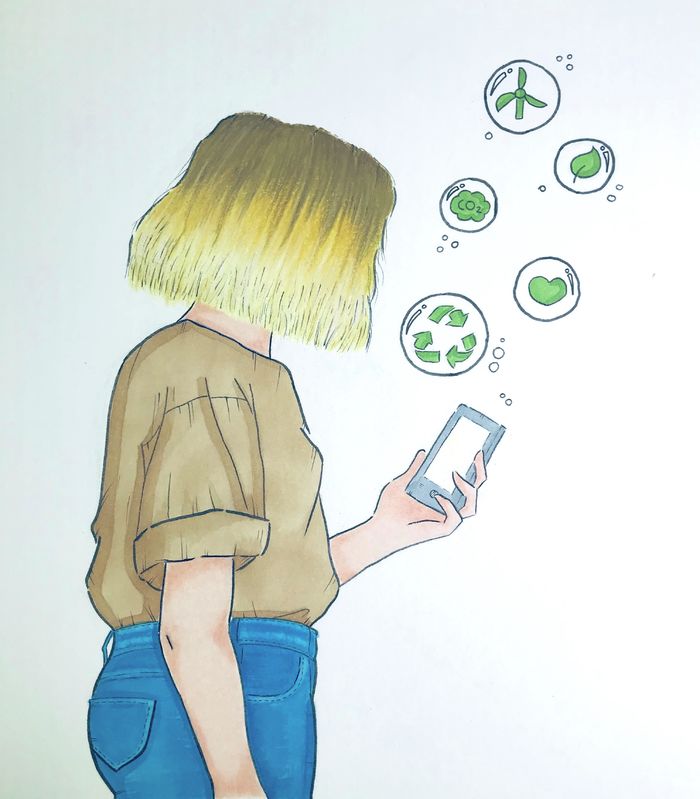ESOOKO: An Environmentalist’s Marketplace
Fashion Columnist Ella Fraser investigates why and how the app ESOOKO is seeking to rejuvenate the fashion industry for sustainably stylish buyers and sellers alike

Online vintage and second-hand clothing marketplaces are revolutionising the way we shop. From Depop and Vinted to Ebay, there is a plethora of apps and websites enabling new possibilities in the world of preloved fashion. Yet, such overwhelming abundance casts a daunting shadow over the minds of average buyers. It begs the question: what app should I use and why?
This is where ESOOKO stands out. 27% of the UK population are currently shopping second hand: 22.5% of which claim climate concerns as their reason for doing so. With the fashion industry accounting for around 10% of global carbon dioxide emissions and over 92 million metric tons of textiles overwhelming our oceans and landfills annually, a surge in sustainable buying is inevitable. ESOOKO — ‘the app for fashion lovers who want to take action for the planet’ — is capitalising on this surge.
“ESOOKO is heralding a new age in fashion’s circular economy, enabling buyers to both reduce their negative impact on the planet and give something back”
It works much like its alternative platforms, allowing members to consume and trade second-hand goods. Yet, there is one fundamental difference. Every time you buy or sell an item, a percentage of your money is donated to an environmental initiative of your choice: everything from coral restoration and tree planting to environmental education charities. You can even track your impact, earning badges every time you reach new milestones in your journey. ESOOKO is heralding a new age in fashion’s circular economy, enabling buyers to both reduce their negative impact on the planet and give something back.
Established Depop sellers and social media influencers are making the shift to ESOOKO to reduce their carbon footprints. Shopzoeemme, Shopyotts, Mia Regan and Holly Berry are just some of the names who’ve announced plans to partially or fully migrate onto ESOOKO, urging their followers to follow them there once the app launches. Yet despite obvious ethical benefits, for many Depop sellers the app appears to provide parallel financial gains. Whilst Depop takes 10% of any profits made, ESOOKO takes only 8% with 2% of this sent directly to charity. Every £1.20 donated through your fees goes towards specific causes: Hubbub will reach 100 people on social media with environmentally-conscious fashion advice, coralive.org will plant one coral, and JUST ONE Tree will plant a tree, offsetting pollution. Through this business model ESOOKO is reaching a wider target audience, engaging with both climate conscious and profit focused sellers.
ESOOKO’s Instagram page has gained traction as a result of such positive publicity, currently weighing in at 13.2k followers. Despite this pre-launch popularity, it is difficult to imagine such an app taking over the second-hand giants just yet. Depop’s 21 million+ users are likely to stay loyal for the foreseeable future but sellers and buyers must recognise the potential for ESOOKO to further revolutionise preloved m-commerce. As fast fashion fills our oceans with plastic and cuts down our trees, ESOOKO strives to reconstruct an industry that is currently contaminating our planet.
 News / Cambridge academics stand out in King’s 2026 Honours List2 January 2026
News / Cambridge academics stand out in King’s 2026 Honours List2 January 2026 Interviews / You don’t need to peak at Cambridge, says Robin Harding31 December 2025
Interviews / You don’t need to peak at Cambridge, says Robin Harding31 December 2025 Comment / Plastic pubs: the problem with Cambridge alehouses 5 January 2026
Comment / Plastic pubs: the problem with Cambridge alehouses 5 January 2026 News / AstraZeneca sues for £32 million over faulty construction at Cambridge Campus31 December 2025
News / AstraZeneca sues for £32 million over faulty construction at Cambridge Campus31 December 2025 News / Cambridge businesses concerned infrastructure delays will hurt growth5 January 2026
News / Cambridge businesses concerned infrastructure delays will hurt growth5 January 2026









